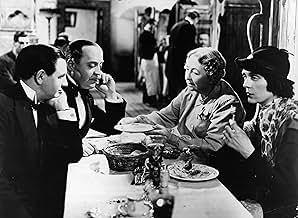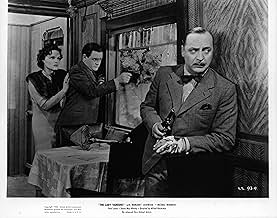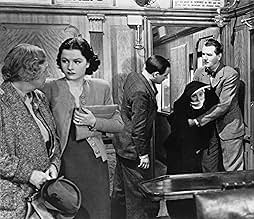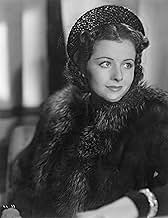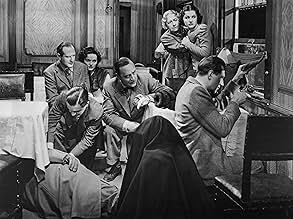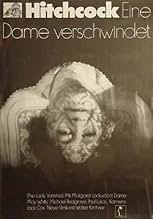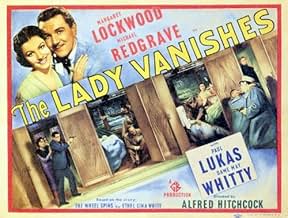Una joven rica de viaje por Europa se da cuenta de que una anciana parece haber desaparecido del tren en el que viaja.Una joven rica de viaje por Europa se da cuenta de que una anciana parece haber desaparecido del tren en el que viaja.Una joven rica de viaje por Europa se da cuenta de que una anciana parece haber desaparecido del tren en el que viaja.
- Dirección
- Guionistas
- Elenco
- Premios
- 1 premio ganado y 1 nominación en total
May Whitty
- Miss Froy
- (as Dame May Whitty)
Selma Vaz Dias
- Signora Doppo
- (as Zelma Vas Dias)
Catherine Lacey
- The Nun
- (as Catherine Lacy)
- Dirección
- Guionistas
- Todo el elenco y el equipo
- Producción, taquilla y más en IMDbPro
Opiniones destacadas
Although Hitchcock was noted for his wit and often sprinkled his films with wickedly funny moments, he seldom gave comic elements such a free reign as he did in THE LADY VANISHES, which is among the most memorable of his early British films. Charmingly cast with Margaret Lockwood, Michael Redgrave, and Dame May Witty in the leads, the extremely witty script mixes 1930s romantic froth with increasingly tense suspense in the story of sharp witted young woman (Lockwood) who befriends an elderly lady (Witty) during a train journey--and is extremely disturbed when, as the title states, the lady vanishes.
Many regard this as the best of Hitchcock's early work, and it is easy to see why: the film demonstrates his growing talent for building suspense from an unlikely mix of the commonplace and the incredible. He is also remarkably blessed in his cast, with Lockwood and Redgrave possessing considerable chemistry and Dame May Witty particularly endearing in one of the character roles at which she so excelled; the supporting cast is also particularly memorable.
Hitchcock guides them all with never a misstep through a complex script that progresses from very lighthearted to extremely sinister and then back again, and the result leaves audiences with both the satisfaction of a well-made thriller and the glow of a romantic comedy. Although it lacks the subtle tones of his later work, THE LADY VANISHES is among my own favorites by Hitchcock, and fans who have never seen it are in for a real treat. Highly recommended.
Gary F. Taylor, aka GFT, Amazon Reviewer
Many regard this as the best of Hitchcock's early work, and it is easy to see why: the film demonstrates his growing talent for building suspense from an unlikely mix of the commonplace and the incredible. He is also remarkably blessed in his cast, with Lockwood and Redgrave possessing considerable chemistry and Dame May Witty particularly endearing in one of the character roles at which she so excelled; the supporting cast is also particularly memorable.
Hitchcock guides them all with never a misstep through a complex script that progresses from very lighthearted to extremely sinister and then back again, and the result leaves audiences with both the satisfaction of a well-made thriller and the glow of a romantic comedy. Although it lacks the subtle tones of his later work, THE LADY VANISHES is among my own favorites by Hitchcock, and fans who have never seen it are in for a real treat. Highly recommended.
Gary F. Taylor, aka GFT, Amazon Reviewer
This is the best of the early Hitchcock films. The plot is absorbing, the dialogue clever and the cast great. Whether or not this was the first of the director's films to place its principal action on a moving train I cannot say, but it's a theme that would come back again in his later work, most notably in "Strangers on a Train."
The film gets off to a somewhat rocky start with the camera panning over an Alpine inn and a train halted mid-journey by an avalanche. I agree with the review who observes that we've become spoilt by more sophisticated special effects. A Lionel half buried in a heap of bleached wheat flower just doesn't cut it nowadays. Think also of the stick figure engulfed in the munitions factory explosion in "Saboteur." I suppose directors of that era had to do with whatever was available.
But after this point the film really takes off, and one scarcely recalls the unpromising opening. Viewers always look for the chemistry or lack thereof between actors. Well, Lockwood and Redgrave definitely have it. One cannot help but enjoy seeing how the initial sparks flying between their clashing characters develop into true love by movie's end. As the two are making their way through the train trying to locate Whitty, they move from one barely plausible predicament to another. But we love it, as one witty exchange turns quickly into another. (For example, Lockwood is asked to describe the missing Whitty and launches into an extremely detailed portrait that leaves not a single button unaccounted for. Then she ends by saying, "That's all I can remember." Counters Redgrave dryly: "Well, you can't have been paying attention.")
Much of the film's action occurs in the fictional country of Bandrika, which seems to be a thinly disguised stand-in for nazi-controlled Austria, so recently annexed by Hitler's Germany. As an amateur linguist, I found myself trying to make sense of the made-up "Bandrikan" spoken by the natives, but of course was unable to do so. (What could it be? A Finno-Ugric language? :) Most of the time the identity of Hitchcock's villains remains deliberately vague, except in "Notorious" and "Torn Curtain," where they are nazis and communists respectively. It works better when he leaves us guessing.
As an amateur musician I loved Hitch's "macguffin," namely, the secret formula encoded in a song which the protagonists had to memorize and carry to the Foreign Office in London. (I should think, however, that a genuine secret message might translate into something more like Schoenberg's twelve-tone music than a central European folk song, but of course that would hardly work in a film. :)
The early Hitchcock seemed to like shootouts, as seen also in the first version of "The Man Who Knew Too Much." But shootouts are an ineffective way to convey suspense, and this is perhaps the one thing that dims what is otherwise a masterpiece.
It's too bad the director lived long enough to see this film remade in 1979. Cybil Shepherd is no Margaret Lockwood, and it's pretty unpleasant-almost embarrassing-to see her shrieking her way through each scene. Couldn't they have waited a few years until he had passed on? They ought to have let him die in peace.
The film gets off to a somewhat rocky start with the camera panning over an Alpine inn and a train halted mid-journey by an avalanche. I agree with the review who observes that we've become spoilt by more sophisticated special effects. A Lionel half buried in a heap of bleached wheat flower just doesn't cut it nowadays. Think also of the stick figure engulfed in the munitions factory explosion in "Saboteur." I suppose directors of that era had to do with whatever was available.
But after this point the film really takes off, and one scarcely recalls the unpromising opening. Viewers always look for the chemistry or lack thereof between actors. Well, Lockwood and Redgrave definitely have it. One cannot help but enjoy seeing how the initial sparks flying between their clashing characters develop into true love by movie's end. As the two are making their way through the train trying to locate Whitty, they move from one barely plausible predicament to another. But we love it, as one witty exchange turns quickly into another. (For example, Lockwood is asked to describe the missing Whitty and launches into an extremely detailed portrait that leaves not a single button unaccounted for. Then she ends by saying, "That's all I can remember." Counters Redgrave dryly: "Well, you can't have been paying attention.")
Much of the film's action occurs in the fictional country of Bandrika, which seems to be a thinly disguised stand-in for nazi-controlled Austria, so recently annexed by Hitler's Germany. As an amateur linguist, I found myself trying to make sense of the made-up "Bandrikan" spoken by the natives, but of course was unable to do so. (What could it be? A Finno-Ugric language? :) Most of the time the identity of Hitchcock's villains remains deliberately vague, except in "Notorious" and "Torn Curtain," where they are nazis and communists respectively. It works better when he leaves us guessing.
As an amateur musician I loved Hitch's "macguffin," namely, the secret formula encoded in a song which the protagonists had to memorize and carry to the Foreign Office in London. (I should think, however, that a genuine secret message might translate into something more like Schoenberg's twelve-tone music than a central European folk song, but of course that would hardly work in a film. :)
The early Hitchcock seemed to like shootouts, as seen also in the first version of "The Man Who Knew Too Much." But shootouts are an ineffective way to convey suspense, and this is perhaps the one thing that dims what is otherwise a masterpiece.
It's too bad the director lived long enough to see this film remade in 1979. Cybil Shepherd is no Margaret Lockwood, and it's pretty unpleasant-almost embarrassing-to see her shrieking her way through each scene. Couldn't they have waited a few years until he had passed on? They ought to have let him die in peace.
"Well, anyway, I refuse to be discouraged. Faint heart never found old lady."
Ah, this was a great movie! One of Hitch's best, and certainly one of his most entertaining. It was funny, thrilling, and just plain old fun to watch.
The story is quite simple. A sweet old lady disappears on a train, and the only person who admits ever seeing her, is a young woman who met her the night before. As she searches for the old lady, she's helped by a roguish young man, and they soon begin to wonder just who this lady is, where she went, and why on earth would so many people go through so much trouble to make it seem like she never existed. It all makes for a very compelling mystery.
The Lady Vanishes features some of the best characters I've ever seen in a Hitchcock film. Margaret Lockwood and Michael Redgrave were great as the two main protagonists, and the witty banter between the two was equaled only by the two dry, cricket-obsessed Englishmen who provided so much of the humor of the film. I found this movie to be similar to Rear Window (no wonder I enjoyed it so much), as there are many subplots among the minor characters that are almost as interesting as the main story.
I firmly believe that this is the best I've seen of Hitchcock's early movies. It has everything from shootouts to nuns in high heels. The Lady Vanishes will convert you to being a fan of Alfred, if you're somehow (drugs?) not already.
Ah, this was a great movie! One of Hitch's best, and certainly one of his most entertaining. It was funny, thrilling, and just plain old fun to watch.
The story is quite simple. A sweet old lady disappears on a train, and the only person who admits ever seeing her, is a young woman who met her the night before. As she searches for the old lady, she's helped by a roguish young man, and they soon begin to wonder just who this lady is, where she went, and why on earth would so many people go through so much trouble to make it seem like she never existed. It all makes for a very compelling mystery.
The Lady Vanishes features some of the best characters I've ever seen in a Hitchcock film. Margaret Lockwood and Michael Redgrave were great as the two main protagonists, and the witty banter between the two was equaled only by the two dry, cricket-obsessed Englishmen who provided so much of the humor of the film. I found this movie to be similar to Rear Window (no wonder I enjoyed it so much), as there are many subplots among the minor characters that are almost as interesting as the main story.
I firmly believe that this is the best I've seen of Hitchcock's early movies. It has everything from shootouts to nuns in high heels. The Lady Vanishes will convert you to being a fan of Alfred, if you're somehow (drugs?) not already.
Alfred Hitchcock was noted for his light comic touch, but history records only one attempt at a full-out comedy, 1955's "The Trouble With Harry." The real trouble with "Harry" is it's not funny, but fortunately Hitchcock did leave us with a much surer and defter comedy in the guise of a thriller. Enter "The Lady Vanishes."
The opening scene gets a lot of hackles from people, as we find ourselves in a mountain valley where, after the credits roll, the camera glides over what is obviously a miniature train set. We even see a toy roadster glide by as the camera closes on the exterior of a model house.
Why, it's so primitive and fake! exclaim viewers accustomed to "Matrix"-style FX.
But they miss the point, and not just because they fail to take account of the time when the film was made. Here's what I think: Hitchcock shot the scene with a deliberate nod at the hokeyness of it, reminding his audience from the start that this is not the real thing but play-acting, to be taken as such. He knows it looks a bit phony (though the arresting pan-and-zoom would be the sort of opening other directors would imitate as soon as the technology let them). The focus of "The Lady Vanishes" is not politics, or even mystery. It is fun, in the same non-critical way as a child's entertainment. In this, Hitchcock succeeds, and creates no mere time capsule but a vessel of entertainment that has withstood decades of changing fashion, because it is first, last, and always fun.
"The Lady Vanishes" is the sort of film that works on pace, craft, and charm. The plot is well thought-out, provided you yourself try not to think about it much. There's really no reason for the story to go down the way it does, and once the movie is over, you begin to see the holes. Why is it necessary for British intelligence to go through so much trouble for info that could be just as easily delivered by telegram, or diplomatic pouch? Why, if you cold-bloodedly swipe a woman from a train, do you leave a witness behind to blurt out that there's been a disappearance? How come a name written on the inside of a train compartment window is erased by a blast of locomotive smoke across the outside of the window? But the engaging plot does what it is supposed to, keeping you interested and wondering what will happen next, rather than why it is happening the way it is.
The storyline of "The Lady Vanishes" is unlike any Hitchcock film. It's so light and airy that it reminds me more of a Tintin comic book, with the mythical Slavic nation of Vandreka the sort of simultaneously quaint and suspicious setting Herge would stick Captain Haddock and the Thompson Twins. Leave aside your sophisticated Dashiell Hammett-fed expectations for a moment. If you let yourself go, you will be transported, and quite entertained. Hitchcock never meshed comedy so thoroughly in the body of a story as he does here. Even "North By Northwest" has its serious spots, but "The Lady Vanishes" features a tense fight in a baggage car that's right out of Abbott & Costello and a climactic shootout that pauses for jokes between Caldicott and Charters, the cricket-mad pair who are a non-stop font of humor.
Margaret Lockwood is an effective plot vehicle as doughty Iris, who refuses to believe a knock on the head made her imagine the presence of the title character, Miss Froy. Michael Redgrave (Vanessa's pop) is a revelation as Gilbert, the folk-music scholar who half-humors, half-believes her strange tale until a stray scrap of trash converts him to her cause. He has a wonderful Errol Flynn-like quality, with his toothbrush mustache and his way with a quip.
Speaking of quips, the dialogue in this movie sparkles throughout, as when the barrister tells his mistress "The law, like Caesar's wife, must be above reproach," and she replies "Even when the law just spent six weeks with Caesar's wife?" Or when Iris asks how she was supposed to have replaced Miss Froy's face with that of the sinister Madame Kummer, and Gilbert replies: "Any change would be an improvement."
Interesting also for the opening, which ambles on for about 20 minutes before it starts to go anywhere, establishing the characters and the comic tone without offering a whiff of what the mystery might be. The close, too, with villains who seem oddly detached once the story is resolved ('Jolly good luck to them,' Paul Lukas observes enigmatically.) But that's for film scholars to muse over.
Hitchcock was never as agreeable a companion as he was here. And few films will put the kind of smile on your face like 'The Lady Vanishes,' no matter how long ago it was made.
The opening scene gets a lot of hackles from people, as we find ourselves in a mountain valley where, after the credits roll, the camera glides over what is obviously a miniature train set. We even see a toy roadster glide by as the camera closes on the exterior of a model house.
Why, it's so primitive and fake! exclaim viewers accustomed to "Matrix"-style FX.
But they miss the point, and not just because they fail to take account of the time when the film was made. Here's what I think: Hitchcock shot the scene with a deliberate nod at the hokeyness of it, reminding his audience from the start that this is not the real thing but play-acting, to be taken as such. He knows it looks a bit phony (though the arresting pan-and-zoom would be the sort of opening other directors would imitate as soon as the technology let them). The focus of "The Lady Vanishes" is not politics, or even mystery. It is fun, in the same non-critical way as a child's entertainment. In this, Hitchcock succeeds, and creates no mere time capsule but a vessel of entertainment that has withstood decades of changing fashion, because it is first, last, and always fun.
"The Lady Vanishes" is the sort of film that works on pace, craft, and charm. The plot is well thought-out, provided you yourself try not to think about it much. There's really no reason for the story to go down the way it does, and once the movie is over, you begin to see the holes. Why is it necessary for British intelligence to go through so much trouble for info that could be just as easily delivered by telegram, or diplomatic pouch? Why, if you cold-bloodedly swipe a woman from a train, do you leave a witness behind to blurt out that there's been a disappearance? How come a name written on the inside of a train compartment window is erased by a blast of locomotive smoke across the outside of the window? But the engaging plot does what it is supposed to, keeping you interested and wondering what will happen next, rather than why it is happening the way it is.
The storyline of "The Lady Vanishes" is unlike any Hitchcock film. It's so light and airy that it reminds me more of a Tintin comic book, with the mythical Slavic nation of Vandreka the sort of simultaneously quaint and suspicious setting Herge would stick Captain Haddock and the Thompson Twins. Leave aside your sophisticated Dashiell Hammett-fed expectations for a moment. If you let yourself go, you will be transported, and quite entertained. Hitchcock never meshed comedy so thoroughly in the body of a story as he does here. Even "North By Northwest" has its serious spots, but "The Lady Vanishes" features a tense fight in a baggage car that's right out of Abbott & Costello and a climactic shootout that pauses for jokes between Caldicott and Charters, the cricket-mad pair who are a non-stop font of humor.
Margaret Lockwood is an effective plot vehicle as doughty Iris, who refuses to believe a knock on the head made her imagine the presence of the title character, Miss Froy. Michael Redgrave (Vanessa's pop) is a revelation as Gilbert, the folk-music scholar who half-humors, half-believes her strange tale until a stray scrap of trash converts him to her cause. He has a wonderful Errol Flynn-like quality, with his toothbrush mustache and his way with a quip.
Speaking of quips, the dialogue in this movie sparkles throughout, as when the barrister tells his mistress "The law, like Caesar's wife, must be above reproach," and she replies "Even when the law just spent six weeks with Caesar's wife?" Or when Iris asks how she was supposed to have replaced Miss Froy's face with that of the sinister Madame Kummer, and Gilbert replies: "Any change would be an improvement."
Interesting also for the opening, which ambles on for about 20 minutes before it starts to go anywhere, establishing the characters and the comic tone without offering a whiff of what the mystery might be. The close, too, with villains who seem oddly detached once the story is resolved ('Jolly good luck to them,' Paul Lukas observes enigmatically.) But that's for film scholars to muse over.
Hitchcock was never as agreeable a companion as he was here. And few films will put the kind of smile on your face like 'The Lady Vanishes,' no matter how long ago it was made.
For what turned out to be his last masterpiece in the United Kingdom before leaving for Hollywood, Alfred Hitchcock went back to a familiar theme of someone being innocently caught up in intrigue.
The someone here is the beautiful Margaret Lockwood who is being gaslighted while on a train in Eastern Europe. She's made the acquaintance of Dame May Witty who disappears from the moving train and no one but Lockwood remembers she even exists.
Lockwood gains a sympathetic if skeptical ally in Michael Redgrave and they search the train for Witty. Of course as it is in Hitchcock films, the train's passengers and crew are not all they seem to be either and in the end the passengers have to fight for their lives.
Although Lockwood is a striking dark beauty, not the cool blondes that Hitchcock normally favored, she's a fine Hitchcock heroine. Best in the supporting cast are Naunton Wayne and Basil Radford who seem like a pair of silly English twits whose only concern is getting back for a big cricket match. They actually come through when the chips are down.
Viewers should also take note of Cecil Parker who plays a barrister on holiday with his mistress whose main concern is staying uninvolved lest news of a scandal kill a judicial appointment he wants. He is one absolute horse's patoot and his death must have been cheered by film audiences in the theaters.
Alfred Hitchcock was about to leave his homeland and the less expensive British film industry for Hollywood and bigger budgets. The Lady Vanishes however is a great example of what can be done even on a skimpy budget by a master craftsman.
The someone here is the beautiful Margaret Lockwood who is being gaslighted while on a train in Eastern Europe. She's made the acquaintance of Dame May Witty who disappears from the moving train and no one but Lockwood remembers she even exists.
Lockwood gains a sympathetic if skeptical ally in Michael Redgrave and they search the train for Witty. Of course as it is in Hitchcock films, the train's passengers and crew are not all they seem to be either and in the end the passengers have to fight for their lives.
Although Lockwood is a striking dark beauty, not the cool blondes that Hitchcock normally favored, she's a fine Hitchcock heroine. Best in the supporting cast are Naunton Wayne and Basil Radford who seem like a pair of silly English twits whose only concern is getting back for a big cricket match. They actually come through when the chips are down.
Viewers should also take note of Cecil Parker who plays a barrister on holiday with his mistress whose main concern is staying uninvolved lest news of a scandal kill a judicial appointment he wants. He is one absolute horse's patoot and his death must have been cheered by film audiences in the theaters.
Alfred Hitchcock was about to leave his homeland and the less expensive British film industry for Hollywood and bigger budgets. The Lady Vanishes however is a great example of what can be done even on a skimpy budget by a master craftsman.
¿Sabías que…?
- TriviaIn order to get a realistic effect, Sir Alfred Hitchcock insisted that there should be no background music except at the beginning and the end. Between those two points, the only music heard is the music sung by the musician outside the hotel, the music tune of Miss Froy, the "Colonel Bogey March" music hummed by Gilbert (Michael Redgrave), the dance music conducted by Gilbert in his hotel room, and the dance music when Iris (Margaret Lockwood) meets Gilbert in the train.
- ErroresIn the noisy dancing scene above Lockwood's hotel room, the clarinet is shown with the mouthpiece turned with the reed upwards. Normally the mouthpiece is turned so that the reed is downwards, but in some European folk traditions the clarinet was played with the mouthpiece "upside-down".
- Citas
Gilbert: Can I help?
Iris Henderson: Only by going away.
Gilbert: No, no, no, no. My father always taught me, never desert a lady in trouble. He even carried that as far as marrying Mother.
- Créditos curiososClosing credits: The Characters in "THE LADY VANISHES" were played by:
- Versiones alternativasA brief segment where a hotel maid bends down to pick up a hat from under a hotel bed is missing from most US releases, including Criterion's first official DVD and all bootlegs. It's intact in all official non-US releases and has been restored for Criterion's 2-disc remastered DVD.
- ConexionesEdited from Oh, Mr. Porter! (1937)
Selecciones populares
Inicia sesión para calificar y agrega a la lista de videos para obtener recomendaciones personalizadas
Detalles
- Fecha de lanzamiento
- País de origen
- Sitio oficial
- Idiomas
- También se conoce como
- The Lady Vanishes
- Locaciones de filmación
- Productora
- Ver más créditos de la compañía en IMDbPro
Taquilla
- Total a nivel mundial
- USD 43,902
- Tiempo de ejecución
- 1h 36min(96 min)
- Color
- Relación de aspecto
- 1.37 : 1
Contribuir a esta página
Sugiere una edición o agrega el contenido que falta


